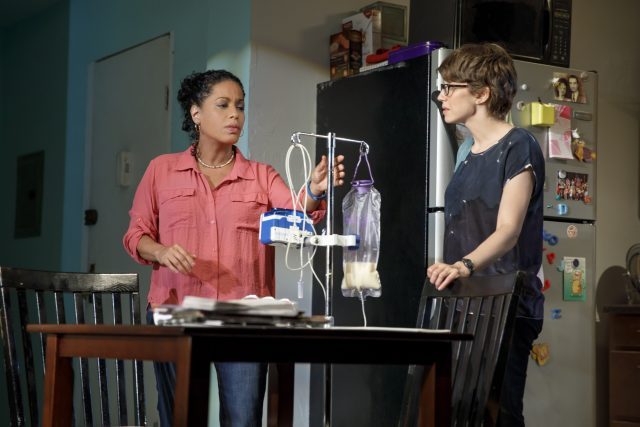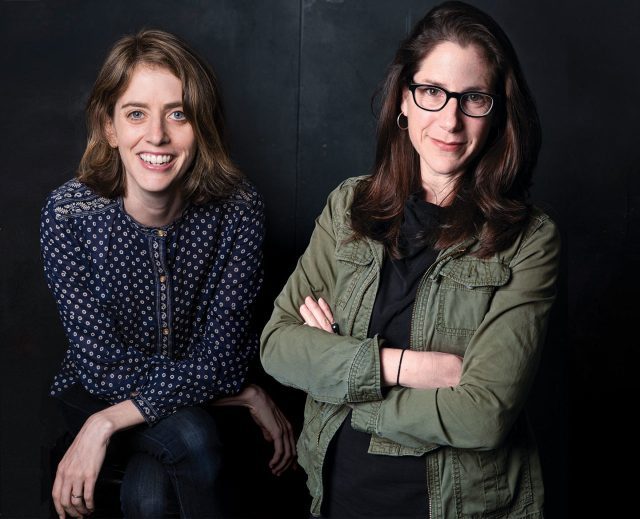
Sherry (Liza Colón-Zayas) and Mary Jane (Carrie Coon) check Alex’s meds in moving, bittersweet drama (photo by Joan Marcus)
New York Theatre Workshop
79 East Fourth St. between Second & Third Aves.
Tuesday – Sunday through October 29, $79
www.nytw.org
The audience never gets a good look at Alex, a seriously ill child, in Amy Herzog’s heart-wrenching and bittersweet Mary Jane. That’s because he’s more than just a chronically sick boy; in the beautifully rendered play, running at New York Theatre Workshop through October 29, he’s representative of the many fears, real and imagined, that haunt us all. Carrie Coon is extraordinary as Mary Jane, a thirtysomething single mother living in a small apartment in Queens with her two-and-a-half-year-old son, Alex, who was born prematurely and requires machines and full-time supervision to keep him alive. A former teacher, Mary Jane works as an administrative assistant for a real estate developer to get health insurance, but the demands of caring for Alex constantly jeopardize that job. As the play opens, the building super, Ruthie (Brenda Wehle), is trying to fix a clog in the sink when she notices that Mary Jane has removed the window guard, which is against the law. “It’s just that he loves looking out the windows, especially when he’s sick and I can’t take him outside?” Mary Jane says. “And it seems like such a small thing but the bars actually do bother him.” We don’t know whether they really bother Alex or not, or whether Mary Jane is projecting her feelings of entrapment in the immensely difficult situation. Alex has several at-home nurses, but the most dedicated is Sherry (Liza Colón-Zayas), who has practically become part of the family; one afternoon she brings over her niece, college student Amelia (Danaya Esperanza), who wants to meet Alex but is taken aback when he doesn’t even seem aware of her presence. A naturally upbeat and helpful person, Mary Jane is also guiding Brianne (Susan Pourfar), a friend of a friend who has a child with similar health issues as Alex. Mary Jane wants to keep Alex out of the hospital, but she has no choice after he suffers a bad seizure and deteriorates. At the hospital, she speaks with the abrupt and direct Dr. Toros (Colón-Zayas); Chaya (Pourfar), a Hasidic woman with a daughter in the same room as Alex; and Tenkei (Wehle), a former teacher and newly ordained Buddhist monk. Meanwhile, she’s on the lookout for Kat (Esperanza), the mysterious music therapist. “There is no more normal,” Sherry tells Mary Jane early on. No, nothing is normal, anywhere, in this brilliantly realized world created by Pulitzer Prize finalist Herzog and two-time Obie-winning director Anne Kauffman.

Amy Herzog and Anne Kaufman have teamed up on the beautiful, heart-wrenching Mary Jane at NYTW
Mary Jane is primarily about a single mother caring for her seriously ill child, yet it is also about so much more, particularly fear and faith. Alex spends nearly the entire play unseen by the audience while Laura Jellinek’s (The Nether, The Wolves) set magically morphs from apartment to hospital before our very eyes. The clever setup takes a cue from her recent Broadway design for Marvin’s Room, in which the aging, ill Marvin is onstage for much of the show but is also essentially unseen, in bed in the back, only occasionally visible in silhouette. It’s a key choice in Mary Jane, as Alex is more than just one specific sick boy; instead, he’s symbolic of the personal crises and potential disasters so many of us face every day. In fact, the word “disaster” is used numerous times throughout the show; Brianne works in disaster management, Mary Jane blames an indecipherable note on her phone as an “autocorrect disaster,” Chaya speaks of the need not to get too overwhelmed by disaster, and Amelia mentions having recently visited the 9/11 Museum with her aunt. Meanwhile, faith becomes a critical topic. “Does my faith make it easier?” Chaya, whose name means “life” in Hebrew, asks Mary Jane, continuing, “I don’t think having a sick child is less painful for me than for people without religion, I don’t think so.” Mary Jane is also very much about women in contemporary society and the problematic health-care system. It’s an all-female cast, and the crew is predominantly made up of women as well. Tony nominee Coon (The Leftovers, Who’s Afraid of Virginia Woolf?) plays Mary Jane with an intoxicating warmth, an everywoman desperately trying to keep on a happy face in extremely difficult times, while the rest of the excellent actors each take on two roles that cleverly relate to each other: Wehle as the philosophical Queens super and the philosophical monk, Colón-Zayas as a nurse and a doctor, Esperanza as a college student and a music therapist, and Pourfar as two very different mothers. “Everybody has stuff,” Mary Jane tells Chaya, who replies, “That’s not true. Some people don’t have stuff. I know a lot of people, in fact, without any stuff at all.” In Mary Jane, there’s certainly a lot of “stuff”: the stuff of life, the stuff of death, and the pain in-between.